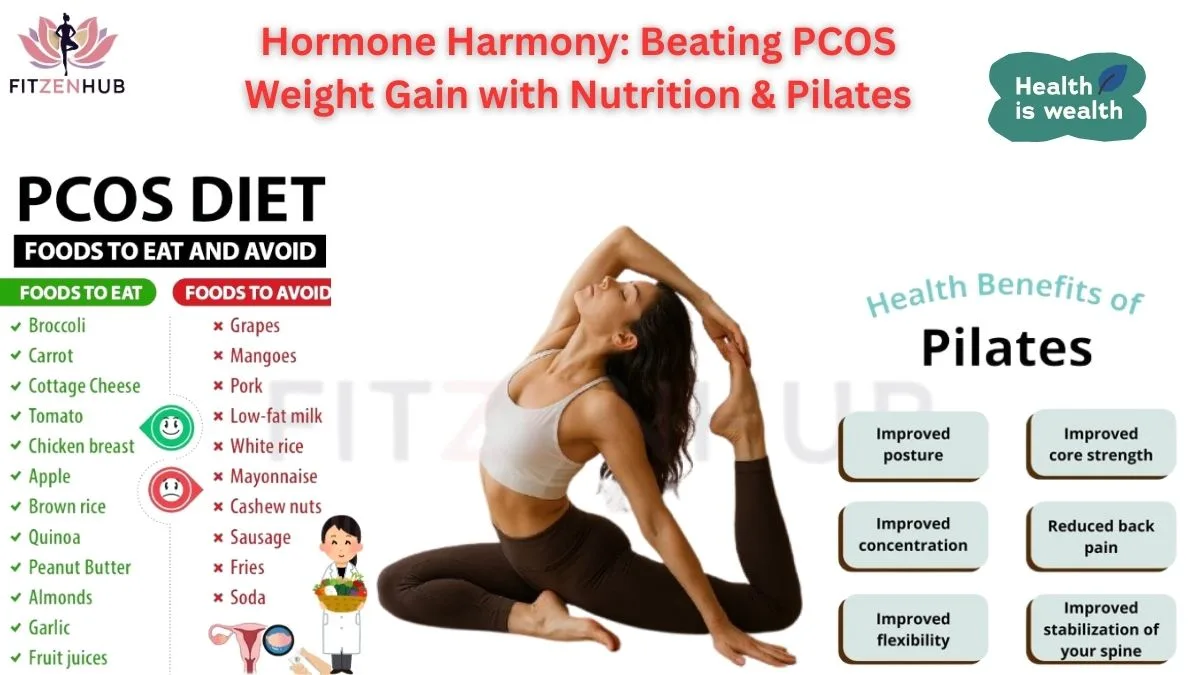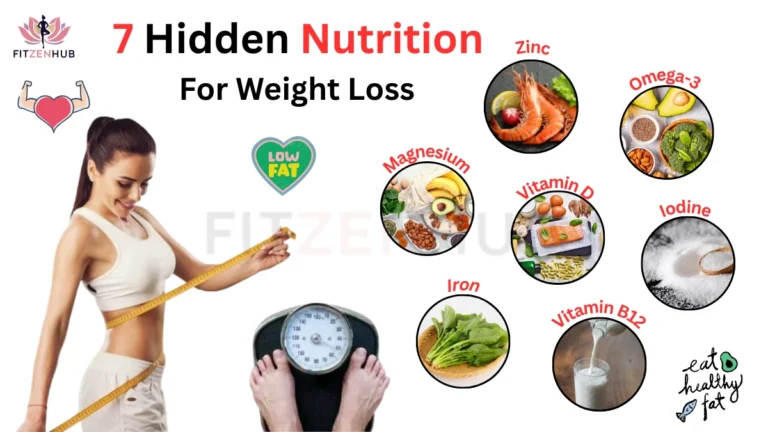Struggling with PCOS weight gain? Discover how balanced nutrition and Pilates can help restore hormone harmony, boost metabolism, and support women’s health.
Unwanted weight gain is one of the most annoying symptoms of PCOS, which affects about 10% of women in the US. Weight control is particularly difficult for women with PCOS because they frequently experience insulin resistance, hormone abnormalities, and a slow metabolism. The good news is that you can promote fat loss, regain hormone balance, and feel better physically and emotionally with the correct diet and Pilates exercises.
Why PCOS Causes Weight Gain
PCOS weight gain is often linked to:
- Insulin resistance – making it more difficult for the body to digest glucose, which results in the accumulation of belly fat.
- Hormonal imbalance – Low progesterone and too much androgens (male hormones) can interfere with metabolism.
- Chronic inflammation – resulting in exhaustion, hunger, and trouble burning fat.
This goes beyond appearance; addressing PCOS-related weight gain early is crucial because it raises the risk of type 2 diabetes, infertility, and cardiovascular problems.
Nutrition for Hormone Balance and PCOS Weight Loss
The first step to overcoming PCOS-related weight gain is nutrition. Your diet can directly influence your insulin response, hormone levels, and metabolism.
1. Choose a Low-Glycemic, Insulin-Friendly Diet
- Focus on whole foods like leafy greens, berries, lean protein, eggs, and legumes.
- Avoid refined carbs, sodas, and sugary snacks that spike blood sugar.
- Consider the insulin resistance diet or a low-carb diet for PCOS, which are proven to help women lose weight faster.
2. Add Hormone-Balancing Nutrients
- Omega-3 fatty acids (salmon, chia seeds, walnuts) reduce inflammation.
- Magnesium and Vitamin D improve insulin sensitivity and hormone regulation.
- Zinc and B vitamins support ovulation and reduce androgen levels.
3. Mindful Eating & Portion Control
- Stick to smaller, balanced meals to prevent overeating.
- Eat protein-rich breakfasts (like eggs or Greek yogurt) to control cravings.
- Stay hydrated with herbal teas and water instead of sugary drinks.
4. Consider PCOS-Friendly Supplements (consult your doctor)
- Inositol (myo-inositol + D-chiro inositol) helps regulate insulin.
- Probiotics improve gut health and reduce inflammation.
- Collagen + protein powders can support muscle recovery post-workout.
How Pilates Helps with PCOS Weight Gain
While nutrition sets the foundation, exercise is the catalyst that boosts metabolism, tones the body, and balances hormones. For women with PCOS, Pilates is an excellent choice.
Benefits of Pilates for PCOS Women:
- Improves Insulin Sensitivity – Pilates enhances glucose uptake in muscles.
- Reduces Stress & Cortisol – Stress hormones worsen PCOS symptoms, and Pilates promotes relaxation.
- Builds Lean Muscle – More muscle = faster metabolism and easier fat loss.
- Supports Hormone Balance – Gentle core-strengthening movements improve circulation and overall endocrine function.
Best Pilates Moves for PCOS-Related Weight Gain
- The Hundred – boosts blood circulation and core strength.
- Leg Circles – tones hips and reduces belly fat.
- Plank Variations – builds total body strength and supports weight loss.
- Bridge Pose – balances pelvic muscles and reduces lower body fat.
Practicing Pilates 3–4 times per week alongside brisk walks or light strength training gives the best results for PCOS weight loss.
Lifestyle Tips for Hormone Harmony
- Prioritize Sleep – Aim for 7–8 hours to regulate cortisol and insulin.
- Manage Stress – Meditation, yoga, or journaling can keep hormones in check.
- Stay Consistent – Nutrition + Pilates work best when practiced daily, not occasionally.
Read More: Why Women Over 30 Struggle to Lose Belly Fat
Medical & Health Sources
- Mayo Clinic – PCOS Overview
👉 https://www.mayoclinic.org/diseases-conditions/pcos - Cleveland Clinic – PCOS: Symptoms, Causes & Treatment
👉 https://my.clevelandclinic.org/health/diseases/8316-polycystic-ovary-syndrome-pcos - NIH – Polycystic Ovary Syndrome (PCOS) Factsheet
👉 https://www.nichd.nih.gov/health/topics/pcos
Final Thoughts
Managing PCOS-related weight gain is not about quick fixes; it’s about creating hormonal harmony through smart nutrition and mindful movement. By adopting a PCOS-friendly diet and practicing Pilates regularly, women can reduce belly fat, improve fertility, balance hormones, and enhance overall well-being.
Remember, every woman’s journey with PCOS is unique. Consult a healthcare provider or a certified nutritionist to personalize your diet and exercise plan. With the right approach, you can take back control of your body and health.
FAQs:
Q1: Can Pilates help with PCOS-related weight gain?
Yes. Pilates improves insulin sensitivity, reduces stress hormones like cortisol, and supports healthy weight management in women with PCOS.
Q2: What diet is best for PCOS weight loss?
A low-glycemic diet rich in lean proteins, fiber, healthy fats, and anti-inflammatory foods helps regulate hormones and control weight.
Q3: How does insulin resistance affect PCOS weight gain?
Insulin resistance causes the body to store more fat, especially around the belly, making weight loss harder for women with PCOS.







